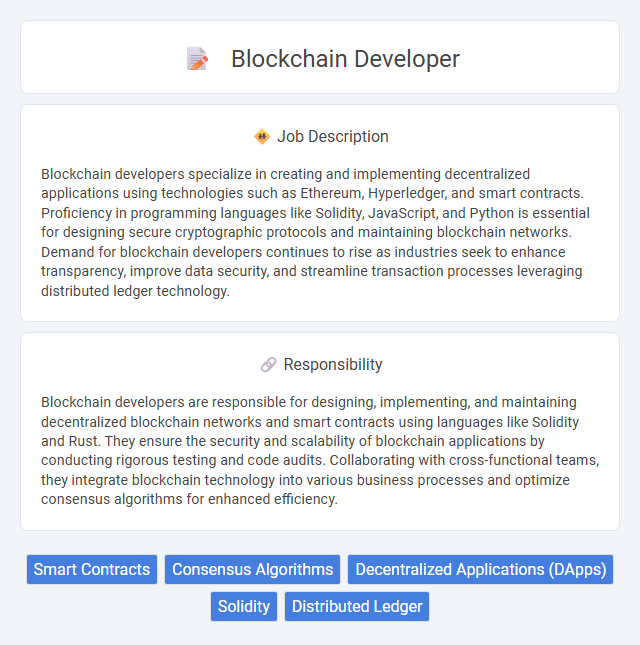
Blockchain developers specialize in creating and implementing decentralized applications using technologies such as Ethereum, Hyperledger, and smart contracts. Proficiency in programming languages like Solidity, JavaScript, and Python is essential for designing secure cryptographic protocols and maintaining blockchain networks. Demand for blockchain developers continues to rise as industries seek to enhance transparency, improve data security, and streamline transaction processes leveraging distributed ledger technology.
Blockchain developer roles may suit individuals with strong analytical skills and a passion for technology, but the rapidly evolving landscape requires continuous learning and adaptability. Those who prefer collaborative and innovative environments might find this career fulfilling, though high pressure and complex problem-solving are common. People who struggle with ambiguity or resist constant updates may face challenges thriving as blockchain developers.
Qualification
Blockchain developers require expertise in cryptography, smart contract programming, and decentralized application (DApp) development using platforms like Ethereum and Hyperledger. Proficiency in programming languages such as Solidity, JavaScript, and Python is essential for building, testing, and deploying blockchain solutions. Strong understanding of consensus algorithms, distributed ledger technology, and security protocols ensures the creation of secure and efficient blockchain networks.
Responsibility
Blockchain developers are responsible for designing, implementing, and maintaining decentralized blockchain networks and smart contracts using languages like Solidity and Rust. They ensure the security and scalability of blockchain applications by conducting rigorous testing and code audits. Collaborating with cross-functional teams, they integrate blockchain technology into various business processes and optimize consensus algorithms for enhanced efficiency.
Benefit
Blockchain developer jobs likely offer high earning potential and opportunities to work on cutting-edge technology that could revolutionize industries such as finance, supply chain, and healthcare. The demand for skilled professionals in this field may increase, leading to job stability and career growth. Benefits often include flexible work environments and the chance to contribute to projects that enhance security and transparency.
Challenge
Blockchain developers likely face complex challenges related to designing secure and scalable decentralized applications on evolving platforms. The role probably requires continuous learning to keep pace with rapid advancements in cryptographic protocols and consensus algorithms. Navigating regulatory uncertainties and ensuring interoperability between different blockchain networks could present ongoing difficulties in development projects.
Career Advancement
Blockchain developers experience rapid career advancement due to high industry demand and evolving technology. Mastery of smart contracts, decentralized applications (dApps), and consensus algorithms significantly enhances job opportunities and salary potential. Continuous learning in emerging blockchain frameworks like Ethereum, Hyperledger, and Solana positions developers for leadership roles and specialized project management.
Key Terms
Smart Contracts
Blockchain developers specializing in smart contracts design and implement self-executing code on decentralized platforms like Ethereum, ensuring secure, transparent, and tamper-proof transactions. Proficiency in Solidity, Truffle, and frameworks such as Hardhat is essential for writing, testing, and deploying smart contracts that automate complex agreements without intermediaries. Expertise in cryptographic principles and blockchain consensus mechanisms enhances the reliability and efficiency of smart contract-driven decentralized applications (DApps).
Consensus Algorithms
Blockchain developers specialize in implementing and optimizing consensus algorithms such as Proof of Work (PoW), Proof of Stake (PoS), and Byzantine Fault Tolerance (BFT) to ensure network security and decentralization. Mastery of consensus mechanisms enables developers to address scalability, energy efficiency, and transaction finality challenges within blockchain ecosystems. Expertise in cryptographic protocols and distributed ledger technologies enhances a developer's ability to innovate and maintain robust, tamper-resistant blockchain networks.
Decentralized Applications (DApps)
Blockchain developers specialize in creating decentralized applications (DApps) that operate on distributed ledger technology, enabling secure and transparent peer-to-peer interactions without intermediaries. They utilize smart contracts, primarily on platforms like Ethereum and Binance Smart Chain, to automate processes and enhance trust within digital ecosystems. Expertise in Solidity, Web3.js, and cryptographic principles is essential for optimizing DApps' performance, scalability, and user experience.
Solidity
Blockchain developers specializing in Solidity are experts in writing smart contracts for Ethereum and other EVM-compatible platforms, enabling decentralized applications (dApps) and automated processes. Proficiency in Solidity includes understanding contract deployment, gas optimization, and security practices to prevent vulnerabilities like reentrancy and overflow attacks. Mastery of development tools such as Truffle, Remix, and Hardhat is essential for efficient testing, debugging, and deployment of blockchain solutions.
Distributed Ledger
Blockchain developers specializing in distributed ledger technology (DLT) design and implement secure, decentralized systems that record transactions across multiple nodes. They utilize protocols like Hyperledger, Ethereum, and Corda to ensure data immutability and transparency while enhancing scalability and security. Expertise in cryptography, consensus algorithms, and smart contract development is essential for optimizing distributed ledger performance in financial services, supply chain management, and healthcare sectors.
 kuljobs.com
kuljobs.com